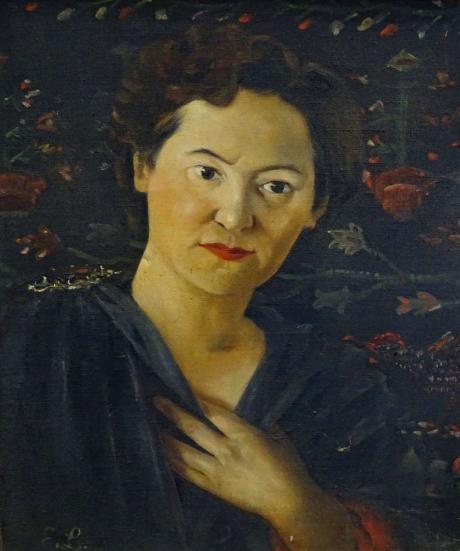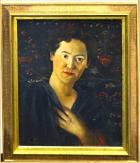with initials "E.L"
Paris Salon, 1968
Freda Swain was born at Portsmouth, England. She studied composition with Charles Villiers Stanford and piano with Dora Matthay and Arthur Alexander at the Royal College of Music, earning awards including the Sullivan Prize in 1921.
In 1924 Swain began teaching at the Royal College and in 1936 she founded the British Music Movement to help promote the efforts of young composers and artists. Swain married Arthur Alexander in 1921, and before World War II the couple toured South Africa and Australia, lecturing, broadcasting and performing recitals.
Swain's first major success was The Harp of Aengus for violin and orchestra (the title refers to the Yeats poem), soloist Achille Rivarde at the Queen’s Hall in January 1925. Her ‘Airmail’ Piano Concerto, mailed in instalments to her husband Arthur Alexander while he was stuck in South Africa during World War II, was performed by Alexander in Cape Town. She composed a one-act opera Second Chance, but never finished a second opera, The Shadowy Waters. Other works include a concertino for piano and strings and other orchestral pieces, songs and song cycles, choral and church music, two string quartets, a Suite for Six Trumpets, and a number of other chamber and instrumental pieces.
One of the last composition pupils of Stanford at the RCM, she also studied the piano with Dora Matthay (1913–17) and with Arthur Alexander, whom she married in 1921. She was appointed professor at the RCM in 1924, the year from which her first mature compositions may be said to date. She first came to prominence with The Harp of Aengus for violin and orchestra (based on a poem by W.B. Yeats), played by Achille Rivarde at Queen’s Hall in January 1925. In 1936 she founded the British Music Movement for the promotion of new music and after World War II she set up the NEMO Concerts, which again promoted her contemporaries’ music as well as her own.
On the outbreak of war, Arthur Alexander was marooned in South Africa. Swain wrote a piano concerto for him; scored on very thin paper it was sent by airmail in a number of instalments. Alexander performed it in Cape Town and elsewhere and it became known as the ‘Airmail’ Concerto. Despite its success, however, and protests by the composer and her supporters, the concerto was never accepted for broadcast by the BBC.Swain was education at the Tobias Matthay School and the RCM, where she was a composition student of Stanford and earned many awards including the Sullivan Prize in 1921. She became a Professor at the RAM from 1924 to 1940 and began the British Music Movement in 1936. A pianist who toured South Africa and Australia and who broadcast in those countries and on the BBC, her compositions were profile and show a distinctively English flavour and a sure grasp of form. They comprise: and opera, Second Chance, premiered in a concert performance at Bath in 1955, two piano concertos, a Clarinet Concerto, a Pastoral Fantasy, the tone poem for violin and orchestra, The Harp of Angus, and other orchestral works, anthems, e.g. Breathe on Me, Breath of God and A Gaelic Prayer; hymns; over a hundred songs like Blessing, Experience, The Lark on Portsdown, The Green Lad From Donegal and Winter Field and settings of Burns, Bridges and Housman; instrumental works for organ (A Country Pastoral: 1957), for piano (e.g. The Windmill, the Two South Africa Impressions - Mimosa and The Lonely Dove - the "sonata poem, The Sea, a Sonata-Saga, Sonatina, a Scherzo for three (!) pianos and a Sonata in F Minor), for stringed instruments (e.g. duets for two violins, two violin sonatas in C Minor and in B Minor, subtitled The River, a Cello Sonata in C, viola pieces - English Reel and Song at Evening and a Danse Barbare for violin and cello) and for wind instruments, including several pieces for clarinet and piano, of which The Willow Tree (1948) and the brief Contrasts (1953) were edited by Frederick Thurston.
Selected works include:
Second Chance, (opera) premiered at Bath in 1955
Clarinet Concerto
Piano Concerto (1939)
A Pastoral Fantasy, tone poem for violin and orchestra
The Harp of Angus (1925)
Breathe on Me, Breath of God
A Gaelic Prayer
A Country Pastoral (1957)
The Windmill, for piano
Mimosa
The Lonely Dove
The Sea (piano quartet, 1938)
Fantasy Suite for oboe and piano
Sonatina
Scherzo for three pianos
Sonata in F minor
Sonata for violin in C minor
Sonata for violin in B minor, The River
Cello Sonata in C
String Quartet No 1 Norfolk (1924)
String Quartet No 2 in G minor (1949)
English Reel for viola
Song at Evening for viola
Danse Barbare for violin and cello
The Willow Tree (1948) for clarinet and piano
Contrasts (1953) for clarinet and piano
Songs:
Blessing
Experience
The Lark on Portsdown
The Green Lad From Donegal
Winter Field



